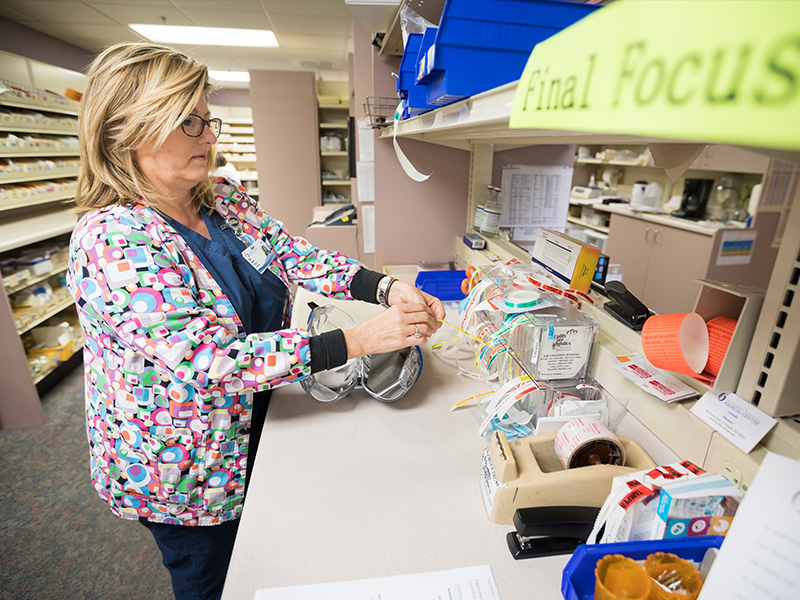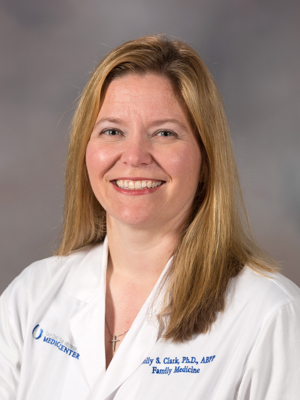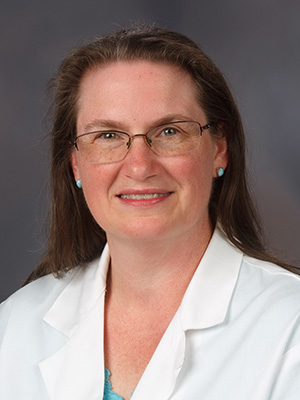Family Medicine tries new responsible opioid prescribing tools

The University of Mississippi Medical Center was chosen to take part in an initiative to improve chronic pain care and support the implementation of recommendations from the CDC’s guidelines surrounding opioid prescribing.
With financial and other support from the Centers for Disease Control and Prevention, the UMMC Department of Family Medicine is collecting data to determine how well they are meeting five of the CDC’s guidelines around opioid prescribing. Providers in the department are also using a new tool in EPIC that reminds them to meet and check certain criteria.

Dr. Molly Clark, a health psychologist, is the principal investigator for the project at UMMC.
“It’s a great opportunity for us to be on the forefront of this and to be able to track and measure exactly what we’re doing for our patients, and have the support of the CDC,” Clark said of the Opioid Quality Improvement Collaborative. “All of these things are centered around: are we doing the best for our patients? And we’re using data to help drive that decision.”
The tool will pull data showing patients who are, for example, co-prescribed opioids and benzodiazepines. It can also indicate whether the patient has completed the recommended urine screen, among other measures the department is tracking.
Both data points address two of the CDC guidelines: avoiding concurrent prescribing of benzodiazepines and opioids and administering a urine screen before the start of opioid therapy to assess for prescribed medications as well as controlled prescription drugs and illicit drugs.
UMMC Department of Family Medicine is also focusing on how well its providers are implementing three other criteria: referring patients who are prescribed more than 90 morphine milligram equivalents, MME for short, daily to pain management; reviewing the patient’s record in the state’s Prescription Monitoring Program before writing a prescription for an opioid; and administering quarterly pain and function assessments, which measure not only pain levels but also how well a person is functioning with daily activities.
“That dose (more than 90 MME) means we really need to look at how we’re managing (their care) … have they been offered other alternative forms of therapy, injections, acupuncture, is surgery needed?” Clark explained.
As Clark and other members of the team collect and analyze data over the year, the CDC will provide support in the form of monthly implementation calls with other health care systems in the cohort, access to a website with shared resources, calls with IT staff to make the measures of quality improvement operational and a case-based clinical webinar series, among others.
It’s important to note, Clark said, that the goal of the initiative is not to eliminate prescription of controlled medication, but to “create an environment where we’re doing it responsibly and providing appropriate patient care.”

Dr. Shannon Pittman, chair of the Department of Family Medicine, said because physicians in family medicine aim to provide comprehensive care for their patients, gaps in care can sometimes occur. The new tool, which enters information into EPIC in a way that is trackable, helps them better identify those gaps.
“When you’re trying to manage a patient’s cough, mammogram, and diabetes, it can be a challenge to try to keep track of having the medication correct on file and doing the tox (toxicology) screen. The care gaps are more easily identified with the enhanced tools that will be deployed in EPIC,” Pittman explained.
The tools, or smart sets, in EPIC have templates for initial and follow-up visits for patients who are prescribed opioids. At the initial visit, for example, the template prompts the provider to discuss the patient’s functional goals, such as walking three times a week without pain.
The provider and patient then discuss an action plan to make that happen, such as physical therapy and water aerobics. At follow up visits, the provider can check in with the patient about how well they’re meeting their goals and make adjustments if needed.
The tool also prompts providers to perform risk assessments on patients and to offer Narcan, a drug used to treat narcotic overdose in emergency situations, when appropriate.

Dr. Ann Kemp is a professor of family medicine and the chair of the Medical Center’s opioid task force. The task force was created in 2018 to give providers across the institution tools to take a more even-handed approach in prescribing opioids while at the same time treating each patient as an individual.
The task force is revising UMMC’s controlled substance policy to incorporate not only the CDC guidelines but also new rules put forth by the Mississippi State Board of Medical Licensure.
“If it works successfully in the pilot and providers feel like it’s beneficial, then it’s something other departments can use if they choose,” Kemp said of how the task force’s work will be impacted by the initiative.


